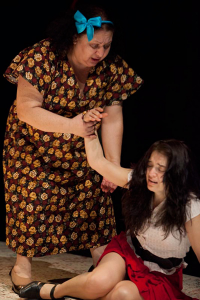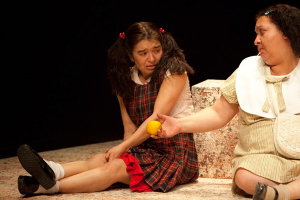SOMETHING BEAUTIFUL HAS ARRIVED
Daniel Serrano’s Roma al final de la VÃa (Rome at the End of the Line) is a highly recommended diamond-in-the-rough, and the 24th Street Theatre presents its US premiere. Julieta Ortiz and Norma Angélica are outstanding in their portrayal of women growing up together through life; bonded by their love for each other, they hope to escape from their small town in Mexico to Rome, Italy. Faithful to its situation, the two-person play is performed entirely in Spanish with English supertitles projected behind the actors. Director Alberto Lomnitz avoids both nosebleed nihilism and sentimental schmaltz by delivering Serrano’s affecting parable with a deft balance of rawness and geniality. Rome at the End of the Line is a must-see production of considerable power, starting off the 15th season of 24th Street Theatre with both potency and poignancy.
 We meet Emilia (Ortiz) and Evangelina (Angélica) as seven-year-old girls from a tiny Mexican town sneaking and maneuvering their way to the train tracks where they hope’”with childish illusion’”to grab a free ride to Rome, Italy and eat pizza for less than ten pesos. Emilia is an abrasive, fiery, ’˜shoot-first, aim-later’ leader, while Evangelina is the cautious, compassionate, more prudent follower. Having arrived too early for the train, they decide to amuse themselves; they share stories, personal feelings, advice, laughter, and tears.
We meet Emilia (Ortiz) and Evangelina (Angélica) as seven-year-old girls from a tiny Mexican town sneaking and maneuvering their way to the train tracks where they hope’”with childish illusion’”to grab a free ride to Rome, Italy and eat pizza for less than ten pesos. Emilia is an abrasive, fiery, ’˜shoot-first, aim-later’ leader, while Evangelina is the cautious, compassionate, more prudent follower. Having arrived too early for the train, they decide to amuse themselves; they share stories, personal feelings, advice, laughter, and tears.
As they get older in the play, age-appropriate issues are discussed: when they are young they talk about birthday parties, when they are adolescents, they talk of cramps and boys, when they pass adolescence, they talk of purity and fidelity, etc. The character’s personalities are illustrated with greater sophistication and depth as they mature; each of these periods are chronologically and distinctively covered as individual scenes within the piece. Serrano’s dialogue is quite amusing with the dramatic moments cutting deeper as the play crescendos.
 Julieta Ortiz gives a rambunctious, fearless performance as Emilia; with marvelous physicality, she embraces the different stages of growth and decay that all humans endure, while at the same time nimbly displaying the evolution of her character’s hope, pride, and brokenness. A few moments felt forced, but those are forgiven with her soul-stirring, passionate dance that brought members of the audience to tears.
Julieta Ortiz gives a rambunctious, fearless performance as Emilia; with marvelous physicality, she embraces the different stages of growth and decay that all humans endure, while at the same time nimbly displaying the evolution of her character’s hope, pride, and brokenness. A few moments felt forced, but those are forgiven with her soul-stirring, passionate dance that brought members of the audience to tears.
Norma Angélica however, is a master actor; her subtlety and nuance fit to serve the piece and complement her co-star best. As Evangelina, she gives an unselfish, seamless, natural portrayal’”which can at times be hilarious. She propelled the story forward by giving each scene its appropriate weight while maintaining a magnificent poise which gives the story fullness and consistency. One particularly moving example occurs when she simultaneously crosses herself as she waves goodbye to her friend; it was a moment that was all together honest, immediate, and absorbing.
 Sound designers Alejandro Lopez Velarde and Javier de la Peza do a tremendous job with the sound design. They create an intimate yet desolate and dusty mood with the soundtrack of acoustic guitars and rolling trains. The minimalist set consists of a few black boxes, two coat racks (on which hang Adriana Olivera’s costumes), and an unobtrusive wall used for Aleida Montejo’s projections. By stripping the set, Lomnitz allows the audience to easily engage with both the supertitles and the evolving relationship between Emilia and Evangelina. Movement designer Isabel Romero deserves plaudits for both Emilia’s beautiful dance and a train sequence that vacillates between regular and slow motion. Ismael Carrasco’s lighting (along with Lomnitz) is not fanciful, but serves the piece respectfully with its utilitarian scheme.
Sound designers Alejandro Lopez Velarde and Javier de la Peza do a tremendous job with the sound design. They create an intimate yet desolate and dusty mood with the soundtrack of acoustic guitars and rolling trains. The minimalist set consists of a few black boxes, two coat racks (on which hang Adriana Olivera’s costumes), and an unobtrusive wall used for Aleida Montejo’s projections. By stripping the set, Lomnitz allows the audience to easily engage with both the supertitles and the evolving relationship between Emilia and Evangelina. Movement designer Isabel Romero deserves plaudits for both Emilia’s beautiful dance and a train sequence that vacillates between regular and slow motion. Ismael Carrasco’s lighting (along with Lomnitz) is not fanciful, but serves the piece respectfully with its utilitarian scheme.
Rome illustrates the expense that accompanies compromise and escapism, yet it also highlights the priceless nature of hope and friendship. It is told in a fresh, vibrant manner that stays with you long after the train leaves the station. It truly rises above the status quo as something wholly exceptional.
photos by Andrea Lopez
Rome at the End of the Line (Roma al final de la VÃa)
24th Street Theatre and Viaje Redondo Producciones at 24th Street Theatre
scheduled to end October 7, 2012
for tickets, call (213) 745-6516 or visit www.24thstreet.org/nowplaying

